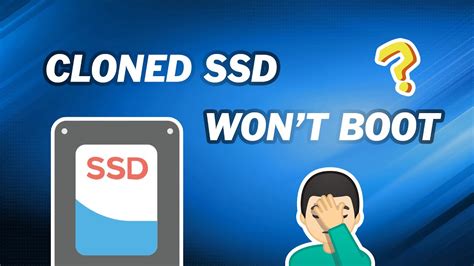cloned hdd won't boot priority into new hdd ,cloning ssd from hdd,cloned hdd won't boot priority into new hdd,My HDD is the only thing that shows in the Boot Priority and I don't know how to get my SSD on the list so I can set it as priority. Does anyone know the fix? I'm using an ASUS . 10 days will give you a more relaxed and in-depth exploration of Malta. You will be able to visit more towns and beaches. plus, dine in more amazing Malta restaurants! I would recommend following our itinerary and just eliminating a town or two that you aren’t as interested in.

When you clone an HDD to a new SSD, it's supposed to be a simple way to upgrade your storage while keeping your operating system, programs, and files intact. However, many users face a frustrating issue where the cloned SSD or HDD simply won’t boot. This problem can arise due to a variety of reasons ranging from improper cloning processes to bootloader issues. In this article, we will explore common causes for the issue of a cloned SSD or HDD not booting and provide solutions for how to resolve it.
The Importance of Cloning: Why We Do It
Before diving into the troubleshooting steps, it's worth revisiting why cloning an HDD to an SSD is a common practice. When you upgrade from a traditional hard disk drive (HDD) to a solid-state drive (SSD), you want to transfer your system, files, and data over to the new drive seamlessly. This eliminates the need to reinstall your operating system, software, and set up your environment all over again.
Cloning a drive involves creating an exact copy of your old drive onto a new one, maintaining the same partition structure and boot configuration. While this process is usually straightforward, problems can arise, especially when the cloned drive won’t boot.
Key Terms to Know:
- Cloning: The process of copying the entire contents of one storage device (HDD) onto another (SSD).
- Bootloader: A program that loads the operating system when a computer starts up.
- MBR (Master Boot Record): A boot sector on the storage device that contains the bootloader and partition information.
- GPT (GUID Partition Table): A newer partition scheme that supports larger disks and more partitions compared to MBR.
Now, let’s get into the common causes for cloning issues and the steps to fix them.
Why Won’t My Cloned SSD or HDD Boot?
There are several reasons why a cloned drive may not boot. Here are some of the most common causes:
1. Incorrect Bootloader on the Cloned Drive
The bootloader is a crucial part of the system’s boot process. When you clone a drive, if the bootloader is not copied or configured properly, the cloned drive will fail to boot. This is often the case when you clone from an HDD with an older MBR partition style to an SSD or another drive with a GPT partition style.
2. Cloning Software Issues
Not all cloning software is created equal. Some cloning utilities may fail to correctly copy certain system files or hidden partitions, such as the EFI system partition (on UEFI-based systems). If any necessary files are missed, the cloned drive won’t be able to boot.
3. Partition Scheme Mismatch
A common problem is when a drive is cloned from one with a Master Boot Record (MBR) partition style to another with GUID Partition Table (GPT). Mismatched partition schemes can cause boot issues since modern systems often use UEFI firmware, which relies on GPT partitions. Conversely, older systems use BIOS firmware and MBR partitions.
4. Improper Cloning Process
Cloning is not always as simple as just using cloning software and pressing "go." There are several parameters that need to be checked, like ensuring that the cloned partition is marked as "active" or setting the correct boot order in the BIOS. A missed step can result in a non-bootable drive.
5. Hardware Compatibility Issues
In some rare cases, the new drive may not be fully compatible with the system hardware. For example, an SSD with a certain controller or firmware might not work properly with a system’s existing setup, leading to boot failures after cloning.
How to Fix Cloned SSD or HDD That Won’t Boot
Now that we understand the possible causes of cloning issues, let’s walk through the steps to fix a cloned SSD or HDD that won’t boot.
Step 1: Check the BIOS/UEFI Settings
The first thing to do is verify that your system is trying to boot from the correct drive. To do this:
1. Enter BIOS/UEFI: Restart your computer and press the key (usually F2, F12, or Delete) to access the BIOS/UEFI menu.
2. Check Boot Order: Ensure that the newly cloned SSD or HDD is set as the first boot device. If not, adjust the boot priority so that it is.
3. UEFI/Legacy Mode: Check if your system is using UEFI or Legacy (BIOS) boot mode. UEFI typically uses GPT, while Legacy uses MBR. Make sure your cloned drive matches the boot mode of your system.

cloned hdd won't boot priority into new hdd Celebrate 150 Years of the Levi’s 501® jean. This is the true story of some very precious cargo of fishermen importing 501® jeans to the docks of Kingston in the ‘70s, and .
cloned hdd won't boot priority into new hdd - cloning ssd from hdd